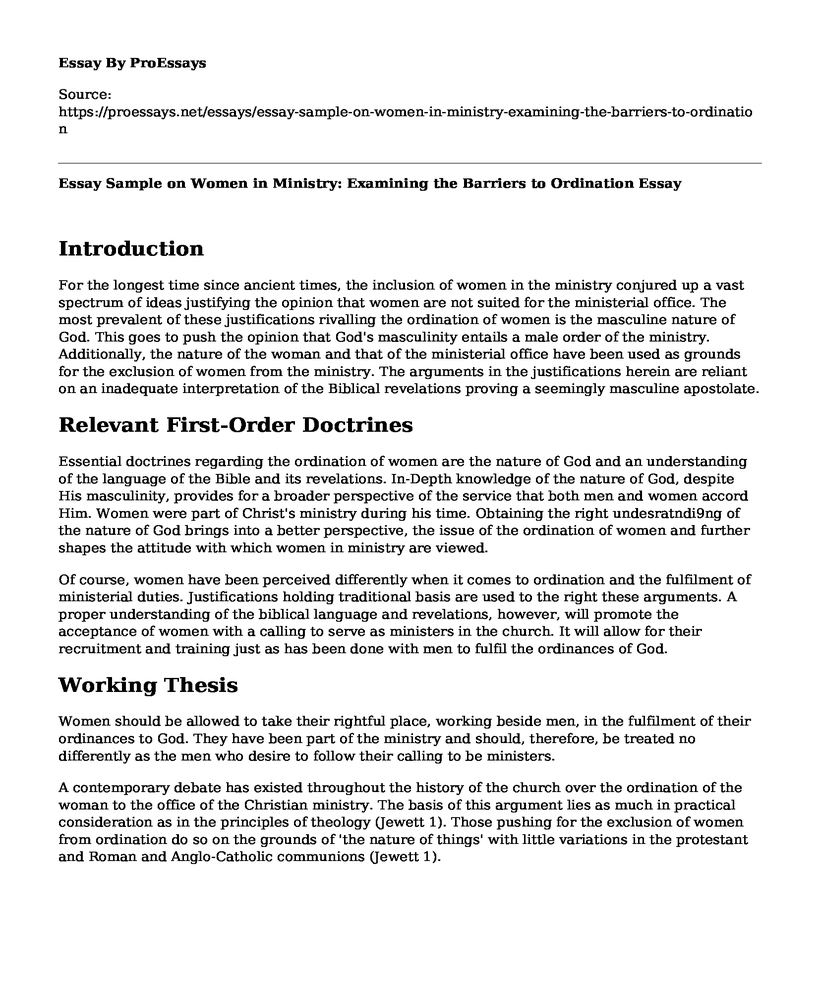Introduction
For the longest time since ancient times, the inclusion of women in the ministry conjured up a vast spectrum of ideas justifying the opinion that women are not suited for the ministerial office. The most prevalent of these justifications rivalling the ordination of women is the masculine nature of God. This goes to push the opinion that God's masculinity entails a male order of the ministry. Additionally, the nature of the woman and that of the ministerial office have been used as grounds for the exclusion of women from the ministry. The arguments in the justifications herein are reliant on an inadequate interpretation of the Biblical revelations proving a seemingly masculine apostolate.
Relevant First-Order Doctrines
Essential doctrines regarding the ordination of women are the nature of God and an understanding of the language of the Bible and its revelations. In-Depth knowledge of the nature of God, despite His masculinity, provides for a broader perspective of the service that both men and women accord Him. Women were part of Christ's ministry during his time. Obtaining the right undesratndi9ng of the nature of God brings into a better perspective, the issue of the ordination of women and further shapes the attitude with which women in ministry are viewed.
Of course, women have been perceived differently when it comes to ordination and the fulfilment of ministerial duties. Justifications holding traditional basis are used to the right these arguments. A proper understanding of the biblical language and revelations, however, will promote the acceptance of women with a calling to serve as ministers in the church. It will allow for their recruitment and training just as has been done with men to fulfil the ordinances of God.
Working Thesis
Women should be allowed to take their rightful place, working beside men, in the fulfilment of their ordinances to God. They have been part of the ministry and should, therefore, be treated no differently as the men who desire to follow their calling to be ministers.
A contemporary debate has existed throughout the history of the church over the ordination of the woman to the office of the Christian ministry. The basis of this argument lies as much in practical consideration as in the principles of theology (Jewett 1). Those pushing for the exclusion of women from ordination do so on the grounds of 'the nature of things' with little variations in the protestant and Roman and Anglo-Catholic communions (Jewett 1).
Discussion
The Bible takes a position in which it presents the relationship between man and woman as a partnership, and more so in the Christian life (Jewett 2). The ordinance of creation in which God created male and female in His image in Gen. 1:26 (Jewett 2), further strengthens the implication of this partnership. Also, the concept of the being new creations in Christ, through which barriers of class, sex, and race are demolished Gal. 3:26-28 (Jewett 2), discredits the traditional perception of the woman being headed by the man, and upholds that the aforementioned partnership outlines that both man and woman should share the privileges of life in complementarity (Jewett 2); these include ordination to the ministry.
The debate on the ordination of the woman has been primarily comparative. Women have been, throughout the church's history but especially in the modern era, prevented from taking up positions of ordained clergy for the simple fact that they are women (Jewett 4). The views presented by theologians imply that their arguments are not objective but inclined to the nature of the woman and not that of the ministry. They view the woman as the source of evil, Eve, even though a woman, Mary, in submission, Luke 1:38, brought salvation to the world (Jewett 4).
Conclusion
Conclusively, it is evident from this analysis that traditional views and not their abilities significantly enforce the lack of acceptance of women in ordained positions. This issue needs to be taken with more significant weight to change its scope and allow for the ordination of women to the office of the Christian ministry.
Works Cited
Jewett, Paul. The ordination of women: An essay on the office of Christian ministry. Wipf and Stock Publishers, 2012.
Cite this page
Essay Sample on Women in Ministry: Examining the Barriers to Ordination. (2023, Jan 25). Retrieved from https://proessays.net/essays/essay-sample-on-women-in-ministry-examining-the-barriers-to-ordination
If you are the original author of this essay and no longer wish to have it published on the ProEssays website, please click below to request its removal:
- Women and the Bible Essay Example
- Difference Between Government and Society - Essay Sample
- Military Personnel Make Great Assets in the Business World Essay Example
- Reconciliation by Polly Clark Essay
- The Significance of Marriage and Family in Society - Essay Sample
- The Impact of Social Media on Families: 72% of Smartphone Holders Connect Online
- Essay Example on Minorities in Information Technology







